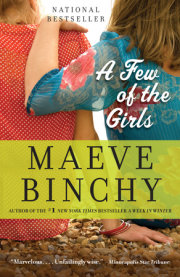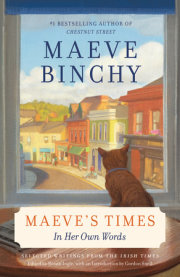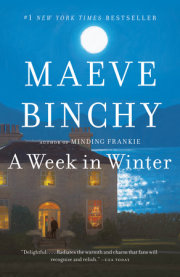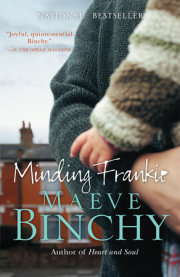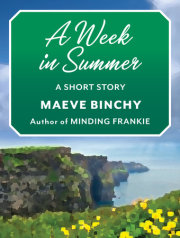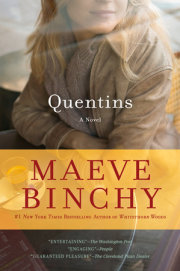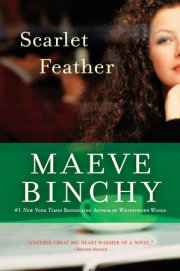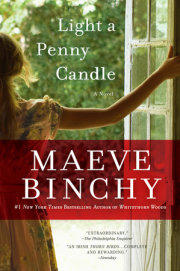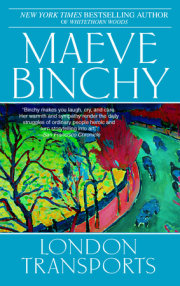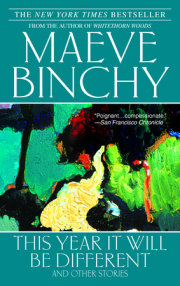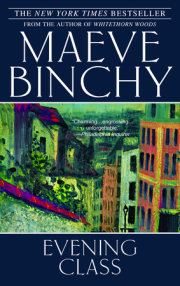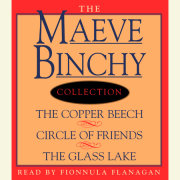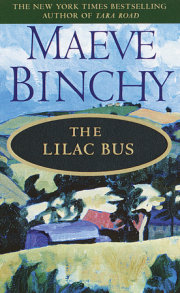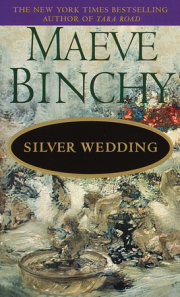Mountainview, despite its pleasant name, was one of the tough areas of Dublin. Some of the big estates were home to drug dealers and it wasn't a place to walk alone at night. The school had its ups and downs, but it was lucky enough to have a headmaster, Tony O'Brien, who could deal with toughness head-on.Some of the older teachers found the change difficult. Things used to be different. The place had been shabby but they'd had respect. The children came from homes where money was short, but they were all keen to make something of themselves. Today they only cared about money, and if someone's big brother was driving a smart car and wearing an expensive leather jacket, it was hard to get interested in having a job in a bank or an office where you might never make enough to have your own house or car and a leather jacket was just a dream. No wonder so many of them joined gangs. And as for respect?Aidan Dunne told his wife, Nora, all about it.Big fellows would push past you in the corridor and sort of nudge the books out of your hand. Then they would laugh and say that sir must be losing his grip. Aidan remembered when they would rush to pick up the books. Not now. Now they called him Baldy, or asked him if he remembered the First World War.It was the same with the women teachers. If they weren't married, some of the really rough fellows would ask them were they frigid or lesbian. If they
were married, they would ask them how many times a night did they do it.“And what do you say?” Nora wondered.“I try to ignore them. I tell myself that they're only insecure kids like always—it's just they have a different way of expressing it. Still, it doesn't make the day's work any easier.”“And how do the women cope?”“The younger ones are on top of it, they say things like, 'Oh, you'd never be able to satisfy me like my old man does,' or else that, sure, they are gay because the only alternative is horrible spotty boys with filthy fingernails.” Aidan shook his head. “By the time I get to the classroom I'm worn out,” he said sadly.“Why don't you give it up?” Nora said suddenly. She taught Italian at an evening class and organized a yearly outing to Italy for the group. She had several other small jobs, but she had no interest in money or pensions or the future. She sat in one of the basket chairs she had bought at a garage sale and tried to persuade Aidan to join her in this carefree lifestyle.But he was a worrier. It would be idiotic to leave his school now several years before retirement date. It would mean no proper pension; if he were to amount to anything he had to provide for Nora and his family from an earlier marriage.“Oh, you've well provided for them,” Nora said cheerfully.“You've given Nell most of the money you got for the house, Grania is married to the headmaster of Mountainview School, Brigid has been made a partner in the travel agency. They should be providing for you, if you come to think of it.”“But you, Nora, what about you? I want to look after you, give you some comfort and pleasures.”“You give me great comfort and pleasures,” she said.“But some
security, Nora,” he pleaded.“I never had security before, I don't want it now.”“I have to finish out my time there.”“Not if you don't like it. What about this lovely life we promised each other and we have mainly had?”“It depends on my having a good safe job, Nora,” he said.“No—it doesn't. Not if it's making you worry, and panic about these louts. We don't need it, Aidan. Not if it's affecting your health.”“It's not affecting my health,” Aidan said firmly.A week later Aidan and Nora were in one of their favorite secondhand bookshops; they were each browsing separately when she suddenly looked over at him. His hand was at his throat and he seemed to be having difficulty catching his breath.“Aidan?” she called.“Sorry, is it very stuffy in here?”“No, indeed—there's a lazy wind coming in from the canal.”“A lazy wind?” he asked distractedly.“You know—a wind that doesn't bother to make the time to go round you so it goes through you . . .” Nora smiled.He didn't smile back.She was alarmed now. “Is there something wrong?”“I don't seem to be able to breathe in,” he said. “Oh, Nora, dear Nora, I hope that I'm not going to faint or anything.”“No, of course you're not. Just sit down there.” She was brisk and practical. First, she spoke to the shop owner.“Where's the nearest hospital?” she asked.“St. Brigid's. Is there a problem?”“I think my husband is having some kind of seizure. Taxi rank?”“Don't bother. I'll drive you,” he said.Nora didn't question it. There would be time to thank him later.“Right, Aidan, Dara is giving us a lift,” she said.“Where to?” he gasped.“To somewhere that will help you breathe properly, my darling,” she said.And he closed his eyes in relief.At the A&E in St. Brigid's the nurses moved him wordlessly into a cubicle. They had given him oxygen and the house doctor had been called.“Take off his trousers,” the doctor said.“What?” Nora was taken aback.“Please, madam.” The Chinese doctor was very courteous. “His lungs are flooded, we need to drain the liquid from him, we have to put him on a catheter . . .”Nora explained this to Aidan.“That's extraordinary—I don't feel as if I need to go to the loo at all,” he said.The oxygen was helping. He was much calmer. Nora looked at a huge container and saw it filling up with what looked like gallons of fluid.“How could that happen?” she asked.“The heart is failing to pump,” the Chinese doctor explained.“He is in heart failure at the moment.”Nora felt all the strength leave her body. The good, kind man that she adored and who loved her too had a heart that had failed him. Life as they knew it was over.In about an hour Aidan felt so much better he was ready to come home. He was surprised when he heard that they were getting a bed for him in St. Brigid's.“But I'm perfectly fine now,” he protested.Nora went home for his pajamas, dressing gown and a sponge bag. She remained calm and reassuring on the outside, but inside she felt that she had lost the will to live.The next few days passed in a blur: visits from teams of senior doctors, their younger assistants with clipboards, nurses, carers, cleaners, trolleys of food. Visitors coming in with anxious faces. And among them was Nora Dunne, tall, wild-eyed, her long red hair with its gray streaks tied back with a black ribbon.She sat beside Aidan's bed and they played chess happily together. If people had been watching them closely they would have noticed that they never talked about household things, bills, repairs, shopping. They didn't talk about neighbors or family or friends. They just lived for each other. And if people had been watching
very carefully they would have realized that Nora was behaving like a robot. She was keeping the show on the road for Aidan.When he was discharged after a week they talked to him seriously about levels of stress in his life. When he told them about life up at the school, the cardiologist advised him to give up the job. Aidan wouldn't even consider discussing it. He would take his medication, he would take long rests each day. But he would not give up his job. It was the only thing he had to offer his wife, some stability. He had not been a good provider. There had been other calls on his finances. A previous family. No, in all honor he had to stay on until his pension was assured.The medical team spoke to Nora too and found her hard to fathom. Over and over she said she wasn't remotely interested in possessions or pensions. They lived in a small and simple rented flat. She could easily go out to work and make the rent. Their needs were not great.“So will you encourage him to retire?” the cardiologist suggested.“No, not if he doesn't want to, Doctor. Why should I stand between him and what he wants to do? Aidan always loved teaching. He would feel such a failure if we took him out of that school.”“Could he not teach at home? Give private tuition, maybe?”“No. Aidan doesn't approve of people having to pay for extra education. We couldn't ask him to go against his principles.”“But you are such a strong personality, Mrs. Dunne. I am sure that you could persuade him.”“I'm sure I could if I tried—but it would not be honest to make him give up what he truly wants to do.”“Even if it's killing him?”“But he's going to die anyway, isn't he?”“We all are, but with care he has plenty of life left.”Nora's face was still empty. “A life of fear and anxiety and thinking that choking will return.”“We can help him make sure that it doesn't. As sure as can be.”“Which isn't totally sure, is it?” Her voice was hard.“No, no more than we can be sure that you won't both be hit by a bus on your way home. But we have a very good record in keeping people alive and well and in normal life after a heart attack. Your husband will be in that number. We have referred him to a heart failure clinic which he will have to attend regularly. It's a heart clinic attached to this hospital. Patients go there to be monitored, to have blood tests, check their medication.”“And why do you call it heart failure?”“Because that's what their hearts are doing: failing to work at the optimum levels.”“And Aidan has to come here every week, is that it?”“To start with, yes. Then as he progresses, less often. He will findit a great reassurance.”Nora was silent.“Truly he will, Mrs. Dunne. All our research has shown that it makes people much more confident and positive, which is exactly what they need at this time.”“And is it funded by a drug company? Do they do experiments on the patients?”“Absolutely not. It is operated under the aegis of this hospital and we are very proud of it.” He bristled with resentment at her suspicions.“I'm sorry, Doctor. To you Aidan is a patient you are looking after. To me he is my whole life. I'm not thinking straight.”“He will need you to think straight now more than ever before,” the doctor said. Clearly, this woman had to be brought on board.“Go to the heart clinic with him, get to know the people there; you may both get a lot from it.”For the first time, the tight, pained look left Nora Dunne's face.She was a handsome woman, the doctor realized.“We'll give it a chance,” she said with a hint of a smile.Excerpted from
HEART AND SOUL by Maeve Binchy Copyright © 2009 by Maeve Binchy. Excerpted by permission of Knopf, a division of Random House, Inc. All rights reserved. No part of this excerpt may be reproduced or reprinted without permission in writing from the publisher.
Copyright © 2009 by Maeve Binchy. All rights reserved. No part of this excerpt may be reproduced or reprinted without permission in writing from the publisher.






